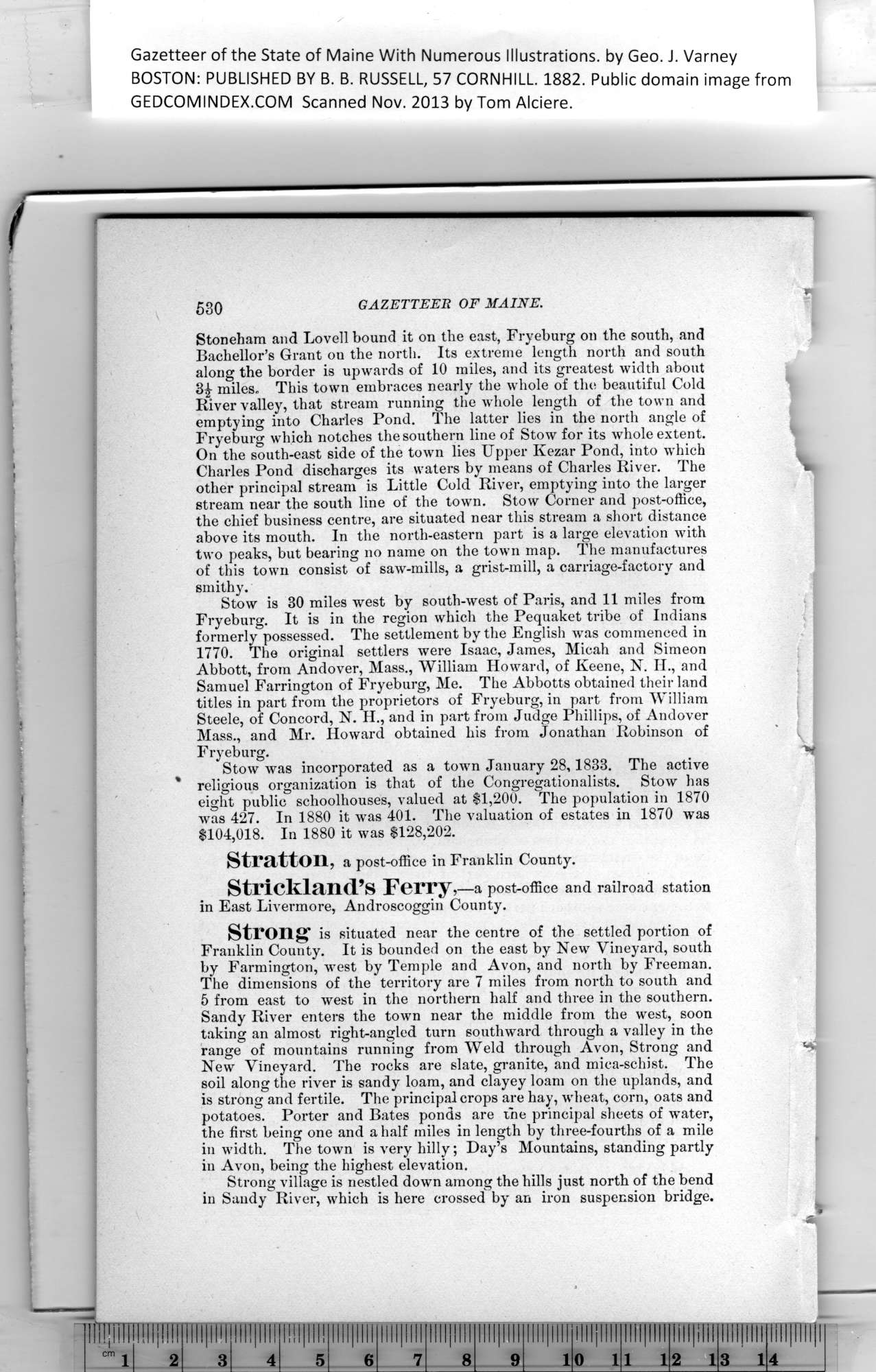|
Gazetteer of the State of Maine With Numerous Illustrations, by Geo. J. Varney
BOSTON: PUBLISHED BY B. B. RUSSELL, 57 CORNHILL. 1882. Public domain image from
530 GAZETTEER OF MAINE.
Stoneham and Lovell bound it on the east, Fryeburg on the south, and
Bachellor’s Grant on the north. Its extreme length north and south
along the border is ujiwards of 10 miles, and its greatest width about
3£ miles. This town embraces nearly the whole of the beautiful Cold
River valley, that stream running the whole length of the town and
emptying into Charles Pond. The latter lies in the north angle of
Fryeburg which notches the southern line of Stow for its whole extent.
On the south-east side of the town lies Upper Kezar Pond, into which
Charles Pond discharges its waters by means of Charles River. The
other principal stream is Little Cold River, emptying into the larger
stream near the south line of the town. Stow Corner and post-office,
the chief business centre, are situated near this stream a short distance
above its mouth. In the north-eastern part is a large elevation with
two peaks, but bearing no name on the town map. The manufactures
of this town consist of saw-mills, a grist-mill, a carriage-factory and
smithy.
Stow is 30 miles west by south-west of Paris, and 11 miles from
Fryeburg. It is in the region which the Pequaket tribe of Indians
formerly possessed. The settlement by the English was commenced in
1770. The original settlers were Isaac, James, Micah and Simeon
Abbott, from Andover, Mass., William Howard, of Keene, N. II., and
Samuel Farrington of Fryeburg, Me. The Abbotts obtained their land
titles in part from the proprietors of Fryeburg, in part from William
Steele, of Concord, N. H., and in part from Judge Phillips, of Andover
Mass., and Mr. Howard obtained his from Jonathan Robinson of
Fryeburg. ^
Stow was incorporated as a town January 28, 1833. The active
% religious organization is that of the Congregationalists. Stow has
eight public schoolhouses, valued at $1,200. The population in 1870
was 427. In 1880 it wras 401. The valuation of estates in 1870 was
$104,018. In 1880 it was $128,202.
Stratton, a post-office in Franklin County.
Strickland’s Ferry,—a post-office and railroad station
in East Livermore, Androscoggin County.
Strong- is situated near the centre of the settled portion of
Franklin County. It is bounded on the east by New Vineyard, south
by Farmington, west by Temple and Avon, and north by Freeman.
The dimensions of the territory are 7 miles from north to south and
5 from east to west in the northern half and three in the southern.
Sandy River enters the town near the middle from the west, soon
taking an almost right-angled turn southward through a valley in the
range of mountains running from Weld through Avon, Strong and *4*
New Vineyard. The rocks are slate, granite, and mica-schist. The
soil along the river is sandy loam, and clayey loam on the uplands, and
is strong and fertile. The principal crops are hay, wheat, corn, oats and
potatoes. Porter and Bates ponds are the principal sheets of water,
the first being one and a half miles in length by three-fourths of a mile
in width. The town is very hilly; Day’s Mountains, standing partly
in Avon, being the highest elevation.
Strong village is nestled down among the hills just north of the bend
in Sandy River, which is here crossed by an iron suspension bridge.
PREVIOUS PAGE ... NEXT PAGE
This page was written in HTML using a program written in Python 3.2
| 